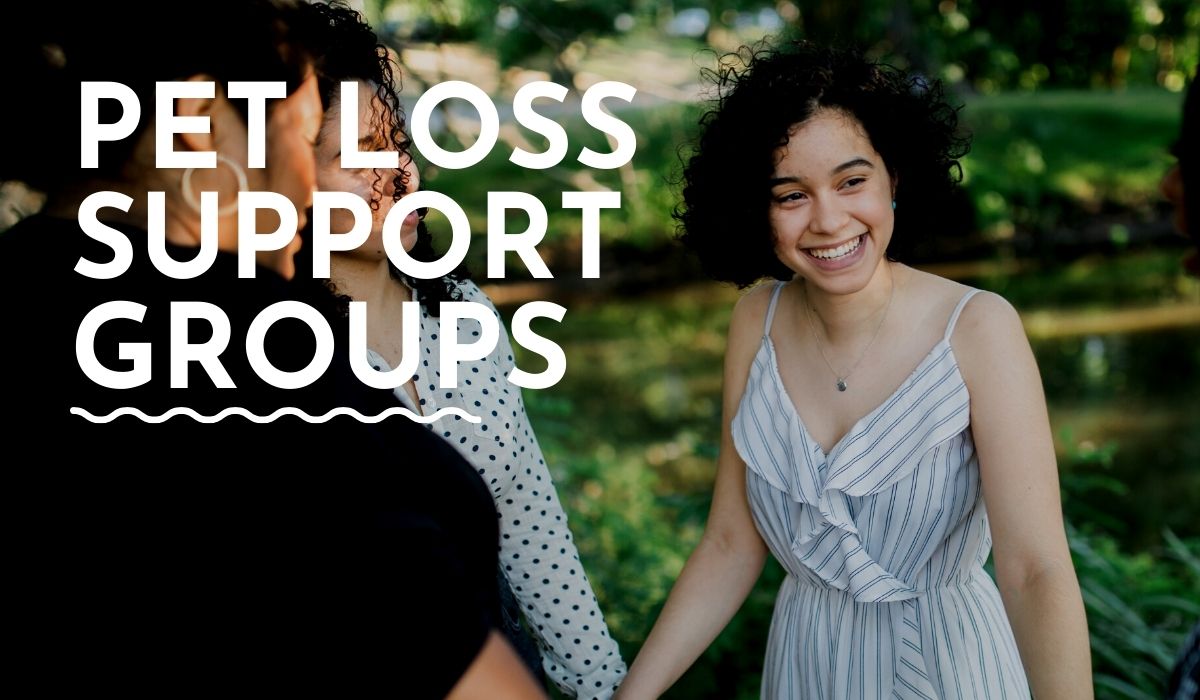Losing a pet can be a devastating experience.
Many pet owners consider their beloved companions to be family members, and their deaths can leave a significant void in their lives.
The grieving process after losing a pet can be challenging, and many people may struggle to come to terms with their loss for a long time.
If you are going through a difficult time after losing a beloved pet, joining a pet bereavement support group can help.
Pet bereavement support groups provide a safe and supportive environment where you can share your thoughts and feelings with others who have gone through similar experiences.
These groups offer emotional support, understanding, and validation, which can help you cope with your grief.
According to a study published in the Journal of Applied Animal Welfare Science, pet owners are likely to experience feelings of loneliness, embarrassment, and even guilt over the level of grief they experience when a pet dies.
Joining a support group can help alleviate these feelings and provide a sense of community.
Therefore, if you have been thinking of joining a pet loss support group but don’t really know where to look or what to expect, continue reading.
In the following sections, we will explore the different types of pet bereavement support groups and how to find the right one for you.

Understanding Pet Bereavement
Understanding pet bereavement involves recognizing the profound emotional impact that the loss of a beloved animal companion can have on individuals.
Losing a pet often feels akin to losing a family member, and pet owners may experience various stages of grief, including denial, anger, bargaining, depression, and acceptance.
Each person’s journey through these stages is unique, and it’s crucial to acknowledge and validate these feelings without judgment.
Support systems, such as friends, family, and specialized pet loss groups, play a vital role in providing comfort and understanding during this difficult time.
Utilizing resources like counseling and community forums can also aid in navigating the grieving process, offering solace and a space to honor the cherished memories of their pet.
The Benefits of Joining a Pet Loss Support Group
Losing a pet can be an incredibly difficult experience, and it’s normal to feel overwhelmed and alone during this time.
Joining a pet bereavement support group can offer many benefits, including:
Emotional Healing
Emotional healing is the most profound benefit of joining a pet loss support group.
These groups often offer a sanctuary where individuals can openly express their grief and emotions in a safe and supportive setting.
The unique pain of losing a pet, often underestimated by those who haven’t experienced it, is fully acknowledged and understood within these groups.
Being surrounded by people who genuinely empathize with your loss is incredibly comforting and validating and can help you heal faster and in a healthier way than if you would do it all on your own.
Shared Experiences
One of the primary benefits of joining a pet bereavement support group is having the opportunity to connect with others who have experienced similar losses.
Sharing your feelings and experiences with others who understand what you’re going through can be incredibly comforting and can help you feel less alone in your grief.
You may also find that hearing how others have coped with their losses can offer you new insights and strategies for dealing with your own grief.
Professional Guidance
Many pet bereavement support groups are led by trained professionals, such as counselors, psychologists, or social workers, who can offer guidance and support as you navigate your grief.
These professionals can help you understand the grieving process, identify healthy and unhealthy coping strategies, and provide the necessary tools to move forward.
Coping Strategies
Joining a pet bereavement support group can also provide you with practical coping strategies you can use to manage your grief.
For example, you may learn about relaxation techniques, such as deep breathing or meditation, that can help you manage your emotions or channel your grief towards creative ventures, such as painting, writing, or composing, as forms of expression.
You may also learn about healthy ways to honor your pet’s memory, such as creating a memorial or participating in a charity walk in their honor.
Network Building
Network building within a pet loss support group is an invaluable benefit that extends beyond the group meetings themselves.
These groups provide a unique environment where individuals can form lasting friendships with those who truly understand the pain of losing a beloved pet.
The Types of Pet Bereavement Support Groups
There are several types of pet bereavement support groups available, which is convenient for many who are going through pet loss but have varying schedules, locations, or comfort levels with different types of interaction.
These groups offer flexibility and accessibility, ensuring that individuals can find the support they need in a format that best suits their circumstances and preferences.
In-Person Support Groups: These groups provide face-to-face interaction, offering a personal touch and immediate emotional support. Meeting in a physical space fosters a sense of community and connection, which can be exceptionally comforting for those who prefer direct interaction.
One-on-One Counseling: For those who prefer personalized guidance, one-on-one counseling with a therapist or counselor specializing in pet loss can be invaluable. This option provides tailored support and allows for the private exploration of emotions.
Online Forums: Accessible from anywhere, online forums allow individuals to share their experiences and emotions at any time. Participants can connect with others globally, providing a diverse range of perspectives and support.
Social Media Groups: Platforms like Facebook and Instagram are homes to numerous pet bereavement groups where members can easily share posts, comments, and messages. These groups offer real-time interaction and are convenient for people who regularly use social media.
Virtual Support Groups: Similar to in-person meetings, these are conducted via video conferencing tools. They offer the benefits of direct interaction while being accessible to those who may not be able to travel to a physical location.
Email Support Groups: These groups communicate primarily through email, providing a more flexible form of support. Participants can read and respond to messages at their own pace, which is ideal for those who prefer written communication.
Each type of pet bereavement support group caters to different needs and preferences, offering flexibility and accessibility.
Whether through face-to-face interaction, the anonymity of online forums, or personalized counseling, these groups provide crucial support for individuals grieving the loss of a pet.
How to Find the Right Pet Loss Support Group For You?
Finding the right pet loss support group is crucial to ensuring you receive the emotional support you need during this challenging time. Here are some key factors and tips to consider when selecting the ideal group for you:
Location Convenience: If you prefer attending in-person meetings, choose a group that is easily accessible from your home or workplace. For online groups, ensure you have a reliable internet connection to fully participate in virtual sessions.
Schedule Compatibility: Look for groups that meet at times convenient for you. Consider your daily commitments and choose a group whose schedule aligns with your availability to ensure consistent participation.
Emotional Support Needs: Reflect on the type of support you’re seeking. Some individuals find comfort in sharing their stories, while others prefer listening. Choose a group that matches your emotional needs, whether it offers active listening, shares coping strategies, or provides a space for quiet reflection.
Group Size: Consider whether you’d feel more comfortable in a small, intimate group setting or a larger, more diverse gathering. Smaller groups often allow for deeper connections, while larger ones might offer a broader range of perspectives.
Type of Interaction: Decide between in-person, online, or hybrid groups. In-person groups offer direct interaction, online groups provide flexibility and anonymity, and hybrid groups offer the best of both worlds.
Group Focus or Philosophy: Research the group’s mission or philosophy. Some groups might focus on spiritual healing, while others emphasize practical coping mechanisms or memorialization. Choose one that resonates with your personal beliefs and healing goals.
Tips for Researching and Evaluating Groups
Read Reviews: Look for testimonials from past or current participants to gauge the group’s effectiveness and atmosphere.
Attend Trial Sessions: Many groups offer initial sessions without commitment. Attend these to see if the group’s dynamic and approach suit your needs.
Ask Questions: Don’t hesitate to inquire about the group’s approach, facilitators’ qualifications, and the type of support they provide. Understanding these elements can help determine if the group will be a good fit for you.
Finding a support group that aligns with your personal preferences and emotional needs is essential for your healing journey.
By considering these factors and taking the time to research and evaluate your options, you can find a supportive community that helps you navigate the complexities of pet loss with care and understanding.
10 Pet Loss Support Groups You Can Join

Everlife Memorials: Nationwide pet loss support group listing site.
Association for Pet Loss and Bereavement (APLB): This organization provides various support services, including chat rooms, to help those grieving the loss of a pet.
IAADP Assistance Dogs Loss Committee (For Service Dogs): This organization supports families in coping with the loss of their service dog through peer-facilitated support calls and resources.
Kali’s Wish Cancer Foundation: A Canadian organization that offers both online and in-person support of pets and their families through pet cancer.
Pet Loss Partners: Virtual & in-person pet loss support group that offers support sessions facilitated by certified pet loss specialists, designed to provide a safe environment for sharing and healing.
Pet Loss Community: Founded by two veterinarians and a psychologist, this site offers free resources and memberships for those who are grieving the loss of a pet.
Rainbow Bridge Pet Loss Grief Support Community: A comprehensive support center featuring forums, chat rooms, and a range of resources to assist in coping with pet loss.
Lap of Love – Support Groups: A network of veterinarians who offer information on anticipatory grief along with support groups and pet loss resources.
Veterinary Wisdom: An online store that, besides carrying a range of personalized bereavement products, such as clay prints that memorialize and honor the special bond between a pet and its owner, also offers grief support resources.
Hoofbeats in Heaven (Equine Loss Support): Devoted to assisting families through the grief and loss of their horse.
Each link directs you to a platform where you can find further information on joining a support group, accessing resources, or connecting with others who understand the profound impact of losing a beloved pet.
Moving Forward
Once you’ve found the right pet loss support group, it’s important to embrace the healing journey with an open heart.
This step marks the beginning of moving forward, transforming grief into a path of personal growth and emotional recovery. Setting personal goals can be a powerful way to navigate this process.
These goals might include expressing emotions more freely, reconnecting with joyful memories, or finding meaningful ways to honor your pet’s legacy.
Utilize the Support Group’s Resources
Utilizing the resources and support provided by the group is crucial. Engage with the community, attend sessions regularly, and take advantage of any materials or activities offered.
The shared experiences within the group can offer comfort and understanding, reminding you that you are not alone in your journey.
Have Patience With Yourself
Patience with yourself is key. Healing is not a linear process, and it’s important to acknowledge and celebrate small victories along the way.
Whether it’s a day when the memories bring more smiles than tears or a moment when you feel connected to a new pet, these milestones are significant.
Stay Open
Stay open to new experiences and connections.
The journey through grief can lead to unexpected friendships and opportunities for personal development.
The community aspect of the support group helps foster resilience and hope, allowing you to build a network that nurtures and supports you during this transformative time.
Moving forward after the loss of a beloved pet involves embracing the support around you, setting intentions for healing, and celebrating the power of community to bring resilience and hope to your grieving process.
